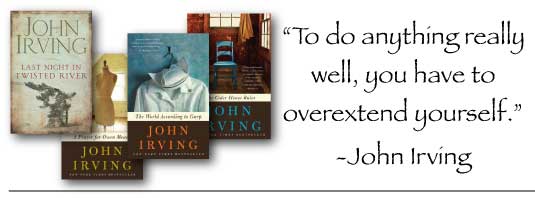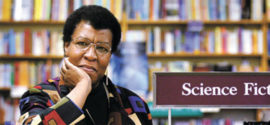John Irving, Award-Winning Author & Screenwriter

John Irving published his first novel at the age of 26. His fourth novel, The World According to Garp, won the National Book Award in 1980. His screenplay adaptation of another one of his novels, The Cider House Rules, won him an Academy Award. Millions of copies of his novels and short stories have been printed, sold, and read worldwide.
You would imagine that words would come easy to a tremendously talented and skilled master storyteller such as John Irving. But for Irving this was not the case. Writing was not automatic, but he has made it work for him. “To do anything really well, you have to overextend yourself,” Irving observes. “In my case, I learned that I just had to pay twice as much attention. I came to appreciate that in doing something over and over again, something that was never natural becomes almost second nature. You learn that you have the capacity for that, and that it doesn’t come overnight.”
As a student at Phillips Exeter Academy, a prep school in New England where his stepfather taught, he worked hard to earn C-minuses in English, and except for a rare few who saw sparks of his potential, his teachers regarded him as “lazy” and “stupid.” Irving remarks on those times during the late 1950’s and early 1960’s in an interview for Dr. Sally Shaywitz’s book, Overcoming Dyslexia.
I simply accepted the conventional wisdom of the day—I was a struggling student; therefore, I was stupid.
I needed five years to past the three-year foreign language requirement…I passed Latin I with a D, and flunked Latin II; then I switched to Spanish, which I barely survived…
It wasn’t until my younger son, Brendan, was diagnosed as slightly dyslexic that I realized how I had been given the shaft. His teachers said that Brendan comprehended everything he read, but that he didn’t comprehend a text as quickly as his peers….As a child, Brendan read with his finger following the sentences—as I read, as I still read. Unless I’ve written it, I read whatever “it” is very slowly—and with my finger.
I wasn’t diagnosed as dyslexic at Exeter; I was seen as just plain stupid. I failed a spelling test and was put in a remedial spelling class…I wish I’d known, when I was a student at Exeter, that there was a word for what made being a student so hard for me; I wish I could have said to my friends that I was dyslexic. Instead I kept quiet, or—to my closest friends—I mad bad jokes about how stupid I was. Brendan knows he’s not stupid; he knows he’s the same kind of student I was.

It was wrestling, and his wrestling coach, Ted Seabrooke, who kept him in school. “He gave me enough confidence in myself—through wrestling—that I was able to take a daily beating in my classes and keep coming back for more,” says Irving. “An Ironic blessing of my having to repeat my senior year at Exeter was that I finally got to be captain of the wrestling team—my sole distinction, my only honor, in five years at the academy.”
While wrestling gave him his edge in prep school, Irving’s dyslexia has helped him develop his edge in his very successful writing career. “It’s become an advantage. In writing a novel, it doesn’t hurt anybody to have to go slowly. It doesn’t hurt anyone as a writer to have to go over something again and again,” he explains.
Irving continues, “One reason I have confidence in writing the kind of novels I write is that I have confidence in my stamina to go over something again and again no matter how difficult it is—whether it is for the fourth or fifth or eighth time. It’s an ability to push myself and not be lazy. This is something that I would ascribe to the difficulties I had to overcome at an early age.”
Related

Blake Charlton, M.D., Author & Cardiologist Fellow at the University of California, S..
Blake Charlton would appear to have it all. A summa cum laude graduate of Yale University, a graduate of Stanford Medical School, and a published author, whose debut novel, Spellwright, was released to glowing reviews from the science fiction community and the publishing industry at large. The novel was the first of a nearly finished trilogy published by Tor Books. Set in a world where words can be physically peeled off a page and used to cast spells, Spellwright relates the misadventures of a wizard named Nicodemus Weal, who has a gift for producing magical language, but a disability that makes any text he touches misspell, with devastating consequences.
Read More
Max Brooks, New York Times Best-Selling Author
Max Brooks, the #1 New York Times bestselling author of The Zombie Survival Guide (Three Rivers Press) and World War Z: An Oral History of the Zombie War (Crown) knows a little something about this. Yet he would argue that his years spent at the Center for Early Education in Hollywood as a young boy with dyslexia left him riddled with anxiety and self-doubt that shadows him to this day. “It was a slog,” he says simply.
Read More
Jeanne Betancourt, Children’s Book Author & Screenwriter
Jeanne Betancourt is the author of 75 novels for children and young adults; more than a dozen film and television scripts; and an adult nonfiction book. She is a recipient of the American Psychological Association’s National Psychological Award for Excellence in the Media and several Children’s Choice Awards. Betancourt also received six Emmy Award nominations for her After-School Specials, written for ABC Television and featuring teens dealing with critical social issues.
Read More
Octavia Butler, Award-Winning Author
Octavia Butler was an award-winning author of thirteen books. She was a pioneer in the science fiction genre, winning both the Nebula and the Hugo Awards. In 1995, Butler was honored with a MacArthur fellowship, and in 2005, she was the recipient of the City College of New York’s Langston Hughes Medal. The Pen Center West awarded her with a lifetime achievement award. She died after a fall outside of her home in 2006.
Read More